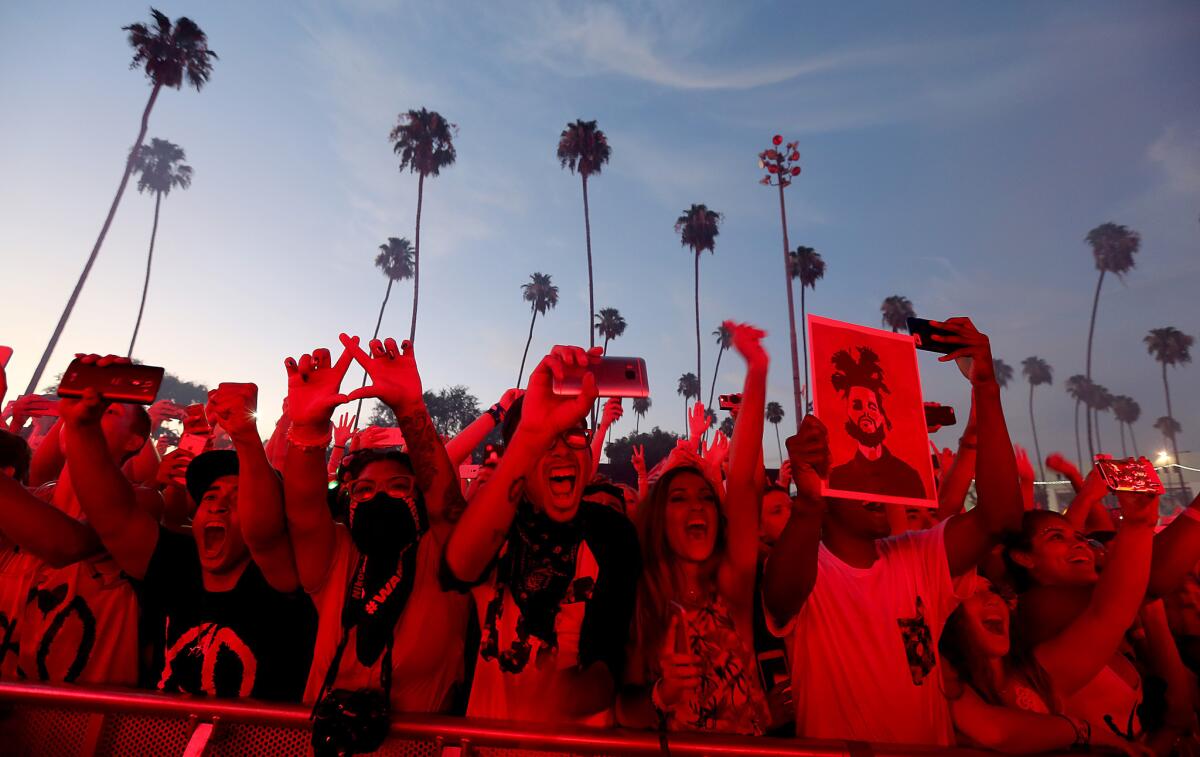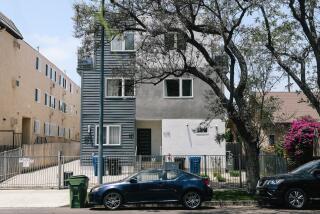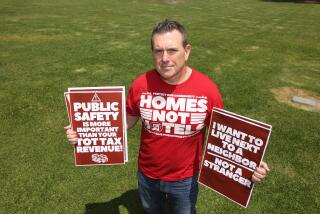After deaths of 2 fans at a rave, Live Nation cancels event and creates more safety precautions

Fans cheer a performance by the Weeknd during Hard Summer at the Pomona Fairplex in August. The festival’s organizers have reversed a decision to deny media credentials for the fall edition, Hard Day of the Dead.
Facing a possible ban on raves at county facilities after the deaths of two young partygoers this month, concert promoter Live Nation has agreed to cancel one upcoming rave at the county-owned Fairplex and to scale back another and implement extra safety precautions.
Two women — Tracy Nguyen, 18, and Katie Dix, 19 — died of apparent drug overdoses after attending Live Nation Entertainment’s Hard Summer at the fairgrounds in Pomona on Aug. 1.
Los Angeles County Supervisor Hilda Solis, whose district includes Pomona, said the supervisors had consulted with county attorneys and public health officials about the case. Supervisors discussed a moratorium on electronic dance music events but have not imposed one, although a statement Friday by Solis and Supervisor Michael D. Antonovich said a ban remains on the table as an option. At their meeting Tuesday, the supervisors will discuss setting up a task force to develop “enforceable health and safety measures and procedures, that would be required for all electronic music festivals on county-owned property.”
In the meantime, Solis said Live Nation and the nonprofit Los Angeles County Fair Assn. have agreed to cancel a planned Sept. 10 rave at the Fairplex. A second two-day event, on Oct. 31 and Nov. 1, will go forward, but will be scaled down from 65,000 to 40,000 attendees per day.
The promoter also agreed to other safety measures, including increased cooling stations and free water for attendees, increased security and emergency medical services on site. Materials warning of the dangers of such party drugs as Ecstasy will also be distributed.
A spokeswoman for Live Nation said people who have bought tickets for the Sept. 10 event will be refunded, but declined to comment further on the agreement or the prospect of a future ban.
Renee Hernandez, spokeswoman for the Fair Assn., said in an emailed statement: “Fairplex will continue to work with Live Nation, the Board of Supervisors and all public agencies to ensure the continued safety of all guests. We will work together to do everything we can.” She said she couldn’t comment on possible bans of future raves.
The issue of drug-related deaths at raves has dogged the county for years. In 2010, a 15-year-old girl died from an overdose of Ecstasy after attending the Electronic Daisy Carnival at the Los Angeles Memorial Coliseum. A task force set up in the wake of that death came up with safety guidelines for electronic music events, including requiring organizers to admit only partygoers older than 18, provide cooling breaks during and after the event, and station medical staff on site. All of those measures were taken at the Hard Summer festival.
County attorneys wrote a memo to the supervisors last week suggesting additional measures the county could take in the wake of the Fairplex deaths. That memo was not released, but a summary provided by Solis’ office said they had examined whether a ban on electronic dance music events could raise 1st Amendment questions or legal issues regarding the Fair Assn.’s contract with Live Nation. The attorneys also analyzed whether “significant health and safety issues and the loss of life associated with these events” could provide justification for a ban. The summary did not say what conclusions the lawyers had reached.
“We continue to study this issue and the propriety of continuing to hold such events on county property,” Solis said in a statement. “While the board supports musical events in the county, what is of paramount importance is the health and safety of the youth attending these events.”
Apart from the two women who died during the Hard Summer music festival, dozens more partygoers landed in nearby hospitals, prompting several emergency room directors to call for an end to large raves in Los Angeles County.
“We know it’s going to happen. When you schedule it, I up-staff and I know I’m going to have sick kids,” said Marc Futernick, emergency services medical director at Dignity Health California Hospital Medical Center in downtown Los Angeles. “Why would we not stop that? What possible benefit is there to the community, other than money, than to allow people to get injured and hurt?”
Twitter: @sewella
Times staff writer Rong-Gong Lin II contributed to this report.
MORE ON ELECTRONIC MUSIC FESTIVALS
L.A. county supervisors vote to study a ban on raves after latest deaths
ER doctors: Drug-fueled raves too dangerous and should be banned
More to Read
Sign up for Essential California
The most important California stories and recommendations in your inbox every morning.
You may occasionally receive promotional content from the Los Angeles Times.











